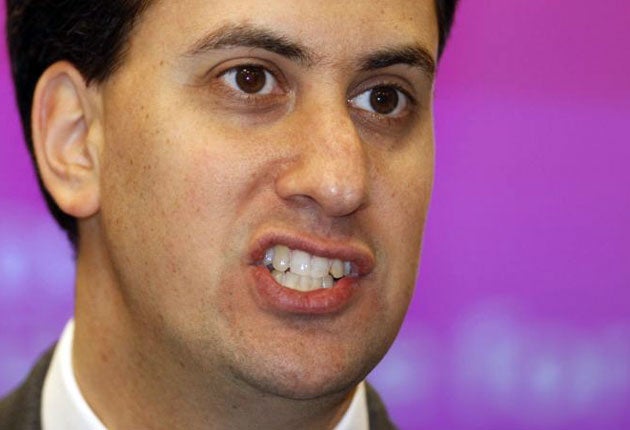Mums come out in a rash over minister's throwaway remark

Gordon Brown was condemned for dithering over his choice of biscuit. David Cameron was lambasted for being too slow at typing.
Yesterday Ed Miliband became the latest political victim to incur the wrath of the nation's middle class mothers when he revealed that he had chosen to use disposable nappies for his son, who is six months old.
During what is now an obligatory right of politcal passage – an internet chat with the Mumsnet website – the Secretary of State for Energy and Climate Change inadvertently reopened a long-running and bitter dispute about the merits of disposable versus cloth nappies when he admitted he had opted to use disposables for his son.
"We use disposable nappies and actually an Environment Agency report from 2005 said that when you take into account the use of energy in washing and drying nappies, it evens out... there are greener disposable nappies which we are trying," he wrote.
This prompted a flurry of responses from cloth nappy devotees who are still furious about the report's conclusion that using washable nappies was no better for the environment than using disposables. Many disputed the findings because it assumed that reusable nappies used large amounts energy because they were washed at high temperatures, tumble dried and ironed.
A contributor called Gizmo said: "Oh, Ed, don't cross the good women of Mumsnet on the subject of washables: I promise you we have more experience than the Environment Agency on the subject."
Another mother calling herself CMOTdibbler urged Mr Miliband: "You should give cloth nappies a try – really that report was a disgrace – they thought people ironed them and boil washed. My nappies were second hand to begin with, got washed at 40, never ironed, mostly line dried, and I only used half amounts of detergent at most. In fact I can lend you some nappies to try if you like."
A contributor nicknamed Neenz asked Mr Miliband: "But what about the impact on landfill that disposable nappies have? At a time when we are trying to recycle as much as possible and send less to landfill, surely disposables are a big no-no."
A chastened Mr Miliband responded: "On nappies, I will look at the report again. Depends where you live as to whether you can hang nappies out to dry..."
But the contributor who asked the original question said it was possible to dry nappies without using an energy-guzzling tumble dryer.
The issue of nappies has been controversial. A baby will get through about 4,000 nappies before he or she is toilet trained. About three billion disposable nappies are thrown away every year in the UK, and most end up in landfill. Nappies make up about four per cent of all household waste and cost councils up to £40m each year to dispose of.
But the study by the Environment Agency concluded that it made little difference to the environment which type of nappy parents opted for. However, the report was widely criticised for assuming that reusable nappies were washed at high temperatures, tumble dried, ironed and used for only one child. A 2008 update to the study conceded that washable nappies could be better for the environment if they were washed in an environmentally-friendly way.
Mr Miliband did however gave a straight answer to the question that had embarrassed the Prime Minister, confessing that his favourite biscuit was a Jaffa Cake.
Nappies: A brief history
* A Swedish paper company called Pauliström is thought to have created the first disposable nappy in 1942 using sheets of tissue inside rubber pants.
* Four years later, an American housewife, Marion Donovan, developed a waterproof cover using shower curtain plastic; the final product, available in 1949, was made of nylon parachute cloth.
* In 1947, George M Schroder invented the first nappy with disposable non-woven fabric.
* Disposable nappies were introduced to the US in 1949 by Johnson & Johnson. They gained in popularity in the 1960s, but their use did not spread widely until the 70s and 80s.
Join our commenting forum
Join thought-provoking conversations, follow other Independent readers and see their replies
Comments
Bookmark popover
Removed from bookmarks